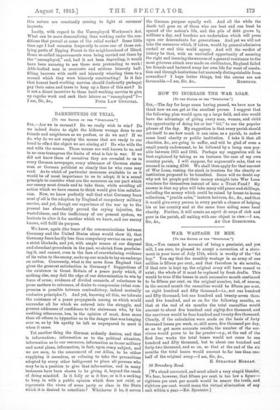EARNESTNESS ON TRIAL.
{TO THE EDITOR OR TH1 " SPECTATOR.")
SIR,—Are we in earnest P Do we really wish to win F Do we indeed desire to right the hideous wrongs done to our friends and neighbours as we profess, or do we note If we do, why do we not employ the means that are ready to our hand to effejt the object we are aiming at ? He who wills the end wills the means. Those means are well known to us, and in no case transgress the limits of what is fair in war. If we did not know them of ourselves they are revealed to us in every German newspaper, every utterance of German states- man or German publicist so clearly that he who runs may read. As to which of particular measures available to us it would be of most importance to us to adopt, it is a sound principle to consider what ar•e the measures on our part which our• enemy most dreads and to take them, while avoiding all action which we have reason to think would give him satisfac- tion. Now, we know perfectly well that what Germany fears most of all is the adoption by England of compulsory military service, and yet, though our experience of the war up to the present has abundantly proved the crying injustice, the wastefulness, and the inefficiency of our present system, we hesitate to alter it for another which we know, and our enemy knows, will fulfil its purpose.
We know, again (the tenor of the communications between Germany and the United States alone would show it), that Germany fears hardly less than compulsory service on our part a strict blockade, and yet, with ample means at our disposal and abundant precedents in the past, we shrink from proclaim- ing it, and cannot, even in the face of overwhelming evidence of its value to the enemy, make up our minds to lay an embargo on cotton. Conversely, what is the news from England that gives the greatest satisfaction in Germany P Suggestions of the existence in Great Britain of a peace party which, if nothing else, may dull the edge of our determination to win by force of arms; evidence of divided counsels, of reluctance to press matters to extremes, of desire to compromise (what com- promise is possible between contradictory, indeed mutually exclusive principles P). And yet, knowing all this, we tolerate the existence of a peace propaganda among us which would surrender all for which we entered into the struggle, and present addresses of confidence to the statesman who, by his soothing utterances, has, in the opinion of most, done more than all ether•s,to hypnotize us to the danger that was hanging over us, as by his apathy he left us unprepared to meet it when it came.
Yet another thing the German ardently &sires, and that is information ; information as to the political situation, information as,to our resources, information as to our• military and naval plans, information, in fact, upon every subject, and we are seen, to the amazement of our Allies, to be either supplying it ourselves, or refusing to take the precautions adopted by every other belligerent to place all persons who may be in a position to give that information, and in many instances have been shown to be giving it, beyond the reach of doing mischief. Is it folly or is it fear, or is it a seeking to keep in with a public opinion which does not exist, or represents the views of some party. or• class in the State Which it is desired to conciliate ? Whichever it be, it serves the German purpose equally well. And all the while the death toll goes on of those who are best and can least be spared of the nation's life, and the pile of debt grows b3 millions a day, and burdens are undertaken which will press upon our descendants for generations. And yet we will not take the measures which, if taken, would by general admission curtail or end this world agony. And will the verdict of history be that, with an unrivalled opportunity of securing the right and insuring the success of a general resistance to the most grievous attack ever• made on civilization, England failed her friends and bartered away her own life for want of resolu- tion and through hesitations but narrowly distinguishable from cowardice P I hope better things, but the omens are not


































 Previous page
Previous page